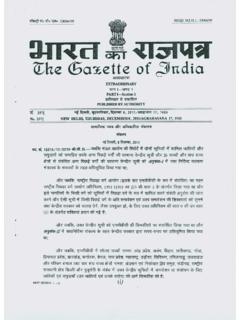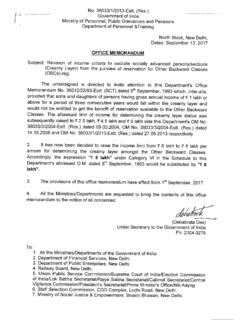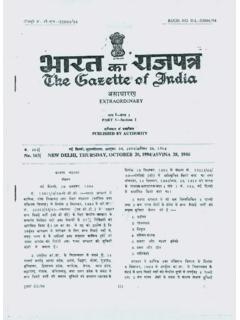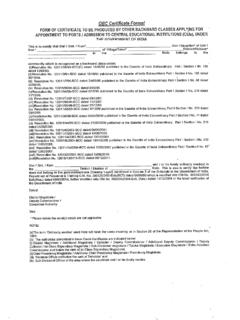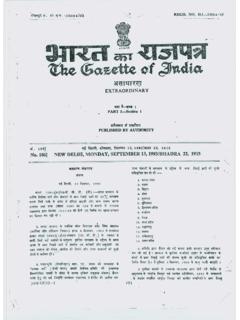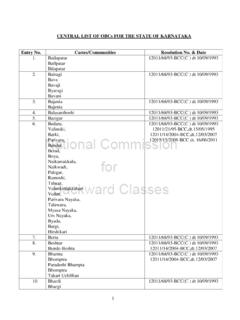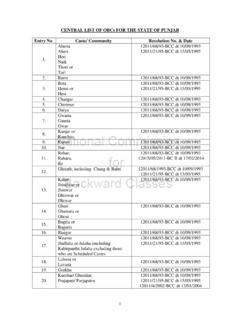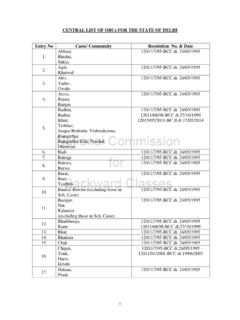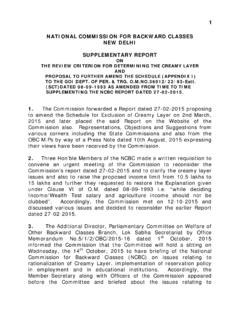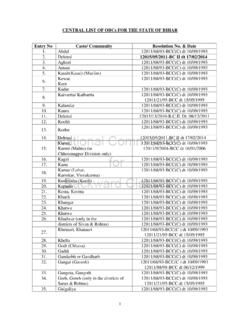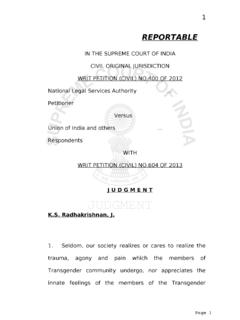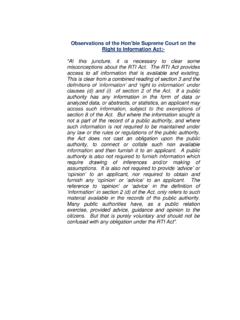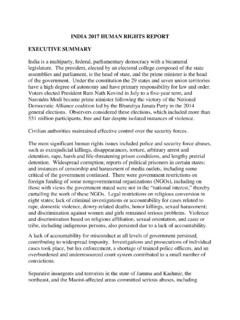Transcription of REPORTABLE IN THE SUPREME COURT OF INDIA …
1 REPORTABLEIN THE SUPREME COURT OF INDIACIVIL ORIGINAL JURISDICTIONWRIT PETITION (CIVIL) NO. 274 OF 2014 RAM SINGH & (S)VERSUSUNION OF (S) (C) No. 261 of 2014, (C) of 2014, (C) of 2014, (C) of 2014, (C) of 2014, (C) No. 357 of 2014& (C) of 2014J U D G M E N TRANJAN GOGOI, challenge in the present group of writ petitions is toa Notification published in the Gazette of INDIA by which the Jat Community has been included inthe Central List of Backward Classes for the States of Bihar,1 Gujarat, Haryana, Himachal Pradesh, Madhya Pradesh, NCTof Delhi, Bharatpur and Dholpur districts of Rajasthan, UttarPradesh and Uttarakhand. The said Notification was issuedpursuant to the decision taken by the Union Cabinet to reject the advice tendered by the NationalCommission for Backward Classes (NCBC) to the contrary onthe ground that the said advice did not adequately take intoaccount the ground realities.
2 RESUME OF THE CORE FACTS to several requests received from individuals,organisations and associations for inclusion of Jats in theCentral List of Backward Classes for the States of Haryana,Rajasthan, Madhya Pradesh and Uttar Pradesh, the NationalCommission for Backward Classes (NCBC) studied their claimsand submitted a report on It recommendedinclusion in the Central List only of the Jats of Rajasthan,except the Bharatpur and Dhaulpur districts. 3. The NCBC also examined the claim for inclusion of Jatsin the Central List for the State of Delhi, and tendered itsadvice rejecting their claim on significant developments that took place aftersubmission of the aforesaid two reports may be relevant to betaken note of at this stage. On the National Commission for BackwardClasses (Power to Review Advice) Rules, 2011 was notified bythe Ministry of Social Justice and Empowerment. By virtue ofthe aforesaid Rules, the NCBC was empowered to review itsadvice tendered to the Central Government under Section 9(1)of the Act.
3 Rule 4 of the Rules provides that the provision ofSection 114 and Order 47 of the Code of Civil Procedure, 1908shall mutatis mutandis apply to a review undertaken by theCommission. a meeting of the NCBC held on , a largenumber of representations received from the Jat Communityfor review of the earlier advice of the NCBC was taken up forconsideration. It was decided that consideration of all suchrepresentations be deferred till finalisation of theSocio-economic Caste Census (SCC) 2011 which was beingconducted by the Registrar General of INDIA all over the3country for enumerating castewise population of the , in a meeting held on the NCBC decidedto approach the Indian Council of Social Science Research(ICSSR) to conduct a full-fledged survey in the States of UttarPradesh, Haryana, Madhya Pradesh, Rajasthan, HimachalPradesh and Gujarat to ascertain the socio-economic status ofthe Jat Community.
4 The said decision was prompted by thenecessity to have adequate quantifiable data to enable theNCBC to consider the request of the Jat Community forinclusion in the Central List of Other Backward Classes in theconcerned What happened to the survey entrusted to the ICSSR would not be very relevant except that in October 2012 theNCBC decided to reduce the comprehensive survey to a 2%sample survey which work, once again, was entrusted to appears that in the midst of the aforesaid exercise theoffice of the Prime Minister addressed a communication to the Ministry of Social Justice andEmpowerment to the effect that a decision has been taken to4constitute a Group of Ministers chaired by the FinanceMinister and comprising, inter alia, of the Home Minister forthe following purpose:-(i)To interact with the representatives of the JatCommunity with regard to their demand forinclusion and to keep them apprised of the progressin the matter.
5 (ii)To monitor the expeditious completion of thesurvey undertaken by the NCBC through the ICSSRand to facilitate an early decision in the matter bythe Group of Ministers in its meetings held and , upon consideration of the matter,perceived that two options were available to it. The first was torequest the NCBC to reconsider its earlier decision ofconducting the sample survey and to tender its advice on thebasis of materials already available. The second was that thesurvey work which had already begun in Gujarat would berestricted to confirmed list of Jat variants and on the basis ofthe results of the survey done by the ICSSR the NCBC willtender its advice. Thereafter, in a meeting of the Cabinet heldon , decision was taken to request NCBC to go5ahead with first option to tender its advice based onexisting material. The cabinet further took the decision thatthe cases of States of Bihar, Uttarakhand and NCT of Delhi bealso included in the reference made to the the basis of the aforesaid decision of the cabinetcommunicated to the NCBC, the Commission took the viewthat as it did not have sufficient expertise in the matter, theICSSR be requested to set up an Expert Committee to conductan extensive literature survey on the subject in order to collectsufficient materials for the impending exercise.
6 Thereafter, theNCBC forwarded all reports/documents received by it in thisregard including representations for and against the inclusionof the Jat Community to the ICSSR. The expert bodyconstituted by the ICSSR submitted its report (hereinafterreferred to as the report of the ICSSR) in the matter whichprimarily was based on the reports of the various StateCommissions submitted to the respective State Governmentsin connection with the inclusion of the Jat Community in theOBC list of the concerned States. The ICSSR, apparently, didnot undertake any study of the other materials by way of6books/literature/representations. The report of the ICSSR,noticeably, did not make any recommendations but only setout the existing facts. The said report of the ICSSR was,thereafter, discussed by the NCBC in several of its , the NCBC addressed letters to the StateGovernments for fixing public hearings in the respective Statecapitals.
7 As there was no response from the States in thisregard, the NCBC published notices for conducting publichearings fixing different dates for hearing the claims andcounter-claims (objections). The public hearings were to beheld in Siri Fort Auditorium, New Delhi on two sets of dates inFebruary, conclusion of the public hearings, which appear tohave received what may at best be termed as a mixedresponse, the NCBC submitted its advice/opinion/reportdated to the Central Government stating that theJat Community had not fulfilled the criteria for inclusion inthe Central List of OBCs. It observed that merely belonging toan agricultural community cannot confer backward status onthe Jats. It suggested the need for a non-caste based7identification of backward classes. The NCBC found that theJats were not socially backward. They were also noteducationally backward.
8 It similarly rejected the claim ofinadequate representation in public employment, finding themadequately represented in armed forces, government servicesand educational institutions. , the Union Cabinet in a meeting held decided that the advice tendered by the NCBC didnot adequately take into account the ground realities. TheCabinet, therefore, resolved not to accept the said advice andinstead to include the Jat Community in the Central List ofBackward Classes for the States of Bihar, Gujarat, Haryana,Himachal Pradesh and NCT of Delhi, Bharatpur and Dholpurdistricts of Rajasthan, Uttar Pradesh and , the impugned notification came to be issued this stage it may be relevant to notice the dates onwhich the Jat Community was included in the List of OBCs inthe States in question which are set out herein:8 (1) of Rajasthan(2) of Uttar Pradesh(3) of Delhi(4) of Bihar(5) of Madhya Pradesh(6) of Himachal Pradesh(7) of Uttarakhand (8) of Haryana-As Special OBC(9)GujaratNot included Relevant Constitutional and Statutory relevant Constitutional and Statutory provisions inthe light of which the issues arising will have to be determinedmay be taken note of at the outset.
9 Article 15 of the Constitution prohibits discrimination onground of religion, race, caste, sex or place of birth. Clause (4)of Article 15 provides that nothing in this article or in clause(2) of article 29 shall prevent the State from making anyspecial provision for the advancement of any socially andeducationally backward classes of citizens or for theScheduled Castes and the Scheduled Tribes . Article 16 whichprovides for equality of opportunity in matters of publicemployment provides in Clause (4) thereof that nothing inthis article shall prevent the State from making any provision9for the reservation of appointments or posts in favour of anybackward class of citizens which, in the opinion of the State, isnot adequately represented in the services under the State . to the provisions of Article 38 and 46 of in PartIV of the Constitution may also be made. Article 38 of theConstitution enjoins a duty on the State to endeavour topromote the welfare of the people by securing and protectingas effectively as it may a social order by, inter alia, eliminatinginequalities in status, facilities and opportunities not onlyamongst individuals but also amongst groups of people eitherresiding in different areas or engaged in different 46 casts upon the State a duty to promote theeducational and economic interests of the weaker sections ofthe population particularly of the Scheduled Castes andScheduled Tribes and to protect such citizens from socialinjustice and exploitation.
10 Article 340 of the Constitutionenvisages the creation of a Commission, inter alia, toinvestigate the conditions of the socially and educationallybackward classes and the difficulties under which suchclasses labour; and to make recommendations as to the steps10that should be taken to remove such difficulties and improvetheir conditions National Commission of Backward Classes Act, 1993was enacted following the decision of this COURT in IndraSawhney & Ors. Vs. Union of INDIA & whichvisualised the necessity of establishment of apermanent/specialised body to which complaints ofnon-inclusion or wrong inclusion of groups, classes andsections in the list of Other Backward Classes can be madefrom time to time. In this regard, the following part of theopinion of Justice Jeevan Reddy in Indra Sawhney case(supra) may be noticed :- We are of the considered view that there ought to bea permanent body, in the nature of a Commission orTribunal, to which complaints of wrong inclusion ornon-inclusion of groups, classes and sections in thelists of Other Backward Classes can be made.
